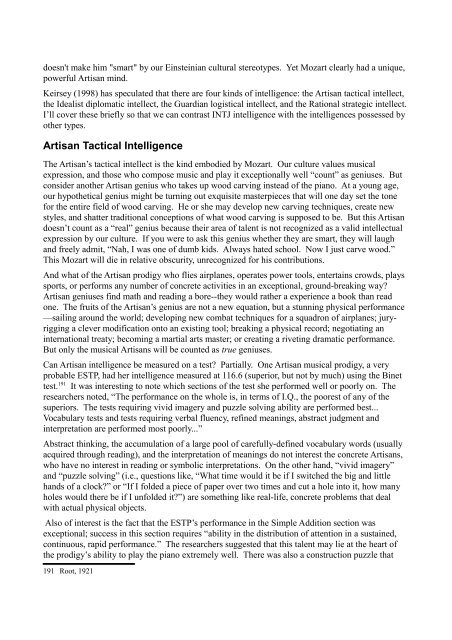You also want an ePaper? Increase the reach of your titles
YUMPU automatically turns print PDFs into web optimized ePapers that Google loves.
doesn't make him "smart" by our Einsteinian cultural stereotypes. Yet Mozart clearly had a unique,<br />
powerful Artisan mind.<br />
Keirsey (1998) has speculated that there are four kinds of intelligence: the Artisan tactical intellect,<br />
the Idealist diplomatic intellect, the Guardian logistical intellect, and the Rational strategic intellect.<br />
I’ll cover these briefly so that we can contrast INTJ intelligence with the intelligences possessed by<br />
other types.<br />
Artisan Tactical Intelligence<br />
The Artisan’s tactical intellect is the kind embodied by Mozart. Our culture values musical<br />
expression, and those who compose music and play it exceptionally well “count” as geniuses. But<br />
consider another Artisan genius who takes up wood carving instead of the piano. At a young age,<br />
our hypothetical genius might be turning out exquisite masterpieces that will one day set the tone<br />
for the entire field of wood carving. He or she may develop new carving techniques, create new<br />
styles, and shatter traditional conceptions of what wood carving is supposed to be. But this Artisan<br />
doesn’t count as a “real” genius because their area of talent is not recognized as a valid intellectual<br />
expression by our culture. If you were to ask this genius whether they are smart, they will laugh<br />
and freely admit, “Nah, I was one of dumb kids. Always hated school. Now I just carve wood.”<br />
This Mozart will die in relative obscurity, unrecognized for his contributions.<br />
And what of the Artisan prodigy who flies airplanes, operates power tools, entertains crowds, plays<br />
sports, or performs any number of concrete activities in an exceptional, ground-breaking way?<br />
Artisan geniuses find math and reading a bore--they would rather a experience a book than read<br />
one. The fruits of the Artisan’s genius are not a new equation, but a stunning physical performance<br />
—sailing around the world; developing new combat techniques for a squadron of airplanes; juryrigging<br />
a clever modification onto an existing tool; breaking a physical record; negotiating an<br />
international treaty; becoming a martial arts master; or creating a riveting dramatic performance.<br />
But only the musical Artisans will be counted as true geniuses.<br />
Can Artisan intelligence be measured on a test? Partially. One Artisan musical prodigy, a very<br />
probable ESTP, had her intelligence measured at 116.6 (superior, but not by much) using the Binet<br />
test. 191 It was interesting to note which sections of the test she performed well or poorly on. The<br />
researchers noted, “The performance on the whole is, in terms of I.Q., the poorest of any of the<br />
superiors. The tests requiring vivid imagery and puzzle solving ability are performed best...<br />
Vocabulary tests and tests requiring verbal fluency, refined meanings, abstract judgment and<br />
interpretation are performed most poorly...”<br />
Abstract thinking, the accumulation of a large pool of carefully-defined vocabulary words (usually<br />
acquired through reading), and the interpretation of meanings do not interest the concrete Artisans,<br />
who have no interest in reading or symbolic interpretations. On the other hand, “vivid imagery”<br />
and “puzzle solving” (i.e., questions like, “What time would it be if I switched the big and little<br />
hands of a clock?” or “If I folded a piece of paper over two times and cut a hole into it, how many<br />
holes would there be if I unfolded it?”) are something like real-life, concrete problems that deal<br />
with actual physical objects.<br />
Also of interest is the fact that the ESTP’s performance in the Simple Addition section was<br />
exceptional; success in this section requires “ability in the distribution of attention in a sustained,<br />
continuous, rapid performance.” The researchers suggested that this talent may lie at the heart of<br />
the prodigy’s ability to play the piano extremely well. There was also a construction puzzle that<br />
191 Root, 1921




